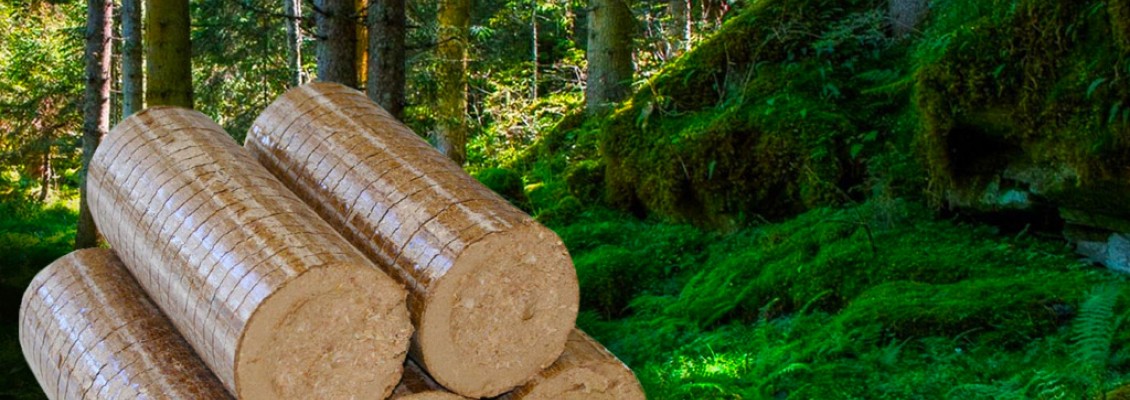
Ως μπρικέτα ξύλου (briquette) ορίζεται το αποτέλεσμα της υψηλής συμπίεσης. Η μπρικέτα είναι ένα 100% φυσικό προϊόν δεδομένου ότι σαν πρώτη ύλη χρησιμοποιείται ξυλώδης βιομάζα και ως συγκολλητική ουσία χρησιμοποιείται η λιγνίνη, η οποία είναι ένα από τα κύρια συστατικά του ξύλου. Είναι στερεή και συμπαγής και από τα κυριότερα χαρακτηριστικά της είναι η χαμηλή περιεχόμενη υγρασία (10%-12%). Έχει επίσης ελάχιστα υπολείμματα στάχτης (1%) τα οποία μπορούν να χρησιμοποιηθούν και σαν λίπασμα στο κήπο. Από τα οικολογικότερα χαρακτηριστικά της είναι η σχεδόν απουσία καπνού κατά την καύση της. Όλα τα παραπάνω συνιστούν την μπρικέτα ένα πλήρως οικολογικό καύσιμο φιλικό προς όλους τους καταναλωτές.
Η διάδοση της μπρικέτας οφείλεται κυρίως στον οικονομικό της χαρακτήρα. Καίγονται με πολύ αργό ρυθμό και η καύση τους έχει διπλάσια διάρκεια από τα ξύλα (κούτσουρα). Η τιμή για την αγορά μπρικέτας είναι πολύ μικρότερη σε σχέση με την αγορά πετρελαίου αντίστοιχης θερμαντικής απόδοσης.
Συγκριτικά με το ξύλο οι μπρικέτες έχουν πολύ μεγαλύτερη θερμογόνο δύναμη, καθώς 1 κιλό μπρικέτας αποδίδει όσο περίπου 2 κιλά ξύλα και περισσότερο
Οι μπρικέτες ξύλου μπορούν να χρησιμοποιηθούν σε συμβατικά και ενεργειακά τζάκια, μπάρμπεκιου, ξυλόσομπες, σόμπες, λέβητες, ξυλόφουρνους αρτοποιίας κ.α. Υπερτερούν επίσης σε θέματα αποθήκευσης και μεταφοράς.
ΠΛΕΟΝΕΚΤΗΜΑΤΑ ΜΠΡΙΓΚΕΤΑΣ
- Είναι οικολογική
Tην συμπαγή συγκόλληση της βιομάζας αναλαμβάνει η κυτταρίνη που εμπεριέχεται στο ξύλο, η οποία κατά τη διάρκεια της θέρμανσης και συμπίεσης της βιομάζας μετατρέπεται σε πολύ ισχυρό συγκολλητικό υλικό. Αυτό έχει σαν συνέπεια να εξασφαλίζει σχεδόν μηδενικές εκπομπές ρύπων σωματιδίων. Οι μπρικέτες συνεισφέρουν μηδαμινά στην εκπομπή διοξειδίου του άνθρακα (CO2) καθώς οι ποσότητες διοξειδίου που απελευθερώνονται στην ατμόσφαιρα κατά την καύση της βιομάζας δεσμεύονται πάλι στα ίδια τα φυτά για την επαναδημιουργία της βιομάζας. Επίσης, συμβάλλουν στην καταπολέμηση του φαινομένου της όξινης βροχής καθώς έχουν μόλις 0,08% περιεκτικότητα σε θείο.
- Παρέχει ασφάλεια
Με τη συνεχή χρήση μπρικέτας αποφεύγουμε εντελώς την περίπτωση ανάφλεξης της καμινάδας καθώς τα στερεά καύσιμα δεν περιέχουν επικίνδυνες ρητίνες που μπορούν να προσκολληθούν στα τοιχώματα της καπνοδόχου προκαλώντας μέσω των αναφλέξεων πυρκαγιά. Με τη χρήση στερεών καυσίμων είμαστε ήσυχοι για την πυρασφάλεια του σπιτιού καθώς δεν διατρέχει κίνδυνος σπινθηρισμού ή σκασίματος λόγω της εξασφαλισμένης χαμηλής περιεκτικότητας σε υγρασία (10%-12%)
- Αποθηκεύεται εύκολα
Η μπρικέτα συνίσταται ιδιαίτερα όπου δεν διαθέτουμε μεγάλο χώρο αποθήκευσης. Διανέμονται πακεταρισμένες σε συσκευασίες των 10 κιλών, δεν λερώνουν το σπίτι και μπορούν να φυλάσσονται όμορφα σε οποιονδήποτε αποθηκευτικό χώρο μικρών διαστάσεων ακόμα και δίπλα στο τζάκι. Πιο συγκεκριμένα, 100 κιλά των καυσόξυλων αντιστοιχούν στα 400 κιλά του κανονικού ξύλου και ο συνολικός τους όγκος είναι περίπου στις διαστάσεις ενός τραπεζιού του σαλονιού. Οι μπρικέτες μεταφέρονται εύκολα ακόμα και στο αυτοκίνητό χωρίς να λερώνουν αφού είναι συσκευασμένες. Επιπλέον λόγω της μικρής υγρασίας τους μπορούμε να τις αποθηκεύσουμε σε αποθήκη χωρίς να υπάρχει δυσοσμία ή ζωύφια. Όλα τα παραπάνω καθιστούν τις μπρικέτες ιδανικό καύσιμο το οποίο μπορεί να αντικαταστήσει με τα καλύτερα αποτελέσματα τα ξύλα για το τζάκι αλλά και την ξυλόσομπα.
- Είναι οικονομικά συμφέρουσα
Αποδεδειγμένα αποτελούν την πιο οικονομική λύση για καύση σε τζάκια ενεργειακά ή μη, ξυλόσομπες και καυστήρες ξύλου. Φυσικά θα ήταν άσκοπο να την συγκρίνουμε με τα καυσόξυλα του εμπορίου που εκτός των άλλων μειονεκτημάτων έχουν πολύ χαμηλότερη θερμογόνο δύναμη.Εδώ η διαφορά μπορεί να ξεκινάει από το διπλάσιο και να φτάνει στο πενταπλάσιο καθώς τα καυσόξυλα δεν είναι σταθερής ποιότητας.Το ξύλο είναι περίπου 50% πιο φθηνό από την μπρικέτα αλλά είναι λάθος να θεωρούμε ότι είναι και πιο οικονομικό καύσιμο, αφού η μπρικέτα έχει 60% -70% μεγαλύτερη θερμική δύναμη από το ξύλο σε σύγκριση ενός κιλού. Ακόμη, ένα σύστημα λέβητα ξύλου επιτυγχάνει μέγιστο βαθμό απόδοσης 80%, ενώ με μπρικέτας 88 - 92% (διαφορά + 12%). Επιπλέον αν λάβουμε υπόψη μας και τον παράγοντα υγρασία τα προιόντα βιομάζας(μπρικέτα) είναι πραγματικά ασυναγώνιστα. Το ποσοστό υγρασίας σε κάθε περίπτωση είναι μεταξύ 8-10% δίνοντας σταθερή καύση χωρίς σπινθηρισμούς και σκασίματα. Αντίθετα τα καυσόξυλα περιέχουν σε πολλές περιπτώσεις 60% υγρασία κάτι που σημαίνει οτι ο καταναλωτής σπαταλά το 60% των χρημάτων του για να αγοράσει ΝΕΡΟ!!

Αφήστε ένα σχόλιο